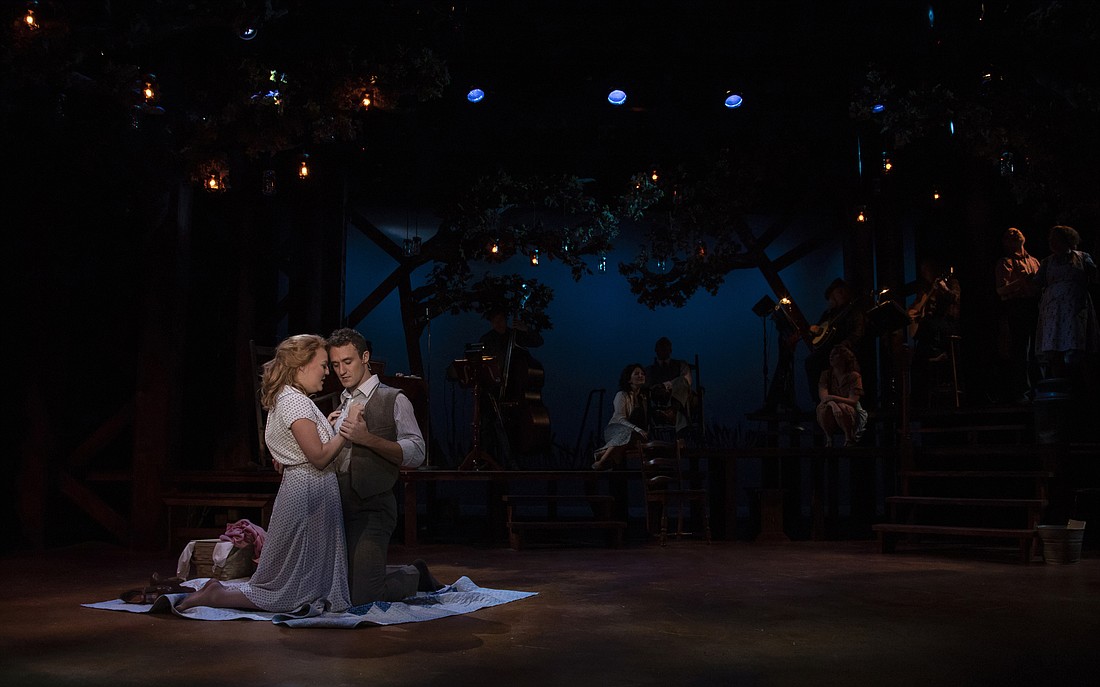- July 26, 2024
-
-
Loading

Loading

Edie Brickell and Steve Martin’s “Bright Star” is now shining at Florida Studio Theatre. Their bluegrass musical is a story of love, loss, reconnection and a young writer’s ambitions in the mid-20th century South. It’s a magical tale. And about as plausible as “Jack in the Beanstalk.”
So be it.
Anthony Burgess once said that telling a story realistically is a boring waste of time. I don’t know if Edie Brickell and Steve Martin are Burgess fans, but they definitely would agree. “Bright Star” is filled with astronomically improbable coincidences and storybook characters. Their musical is basically a fairy tale. It just happens to be set in North Carolina.
The story alternates between 1945 and 1923. In the post-war scenes, Alice Murphy (Meredith Jones) is the editor of the Asheville Southern Journal. (She’s tough as nails and once made Ernest Hemingway cry.) In the jazz age, Alice was a dreamy, bright, rebellious teen in a family way. Her lover, Jimmy Ray Dobbs (Blake Price), was the scion of a powerful patriarch (Travis Mitchell) — and Daddy Dobbs was dastardly indeed. Mindful of his legacy, he hushed up the scandalous pregnancy, kept the couple apart, hid Alice in a cabin and made the baby disappear after its birth. In the face of that heartbreak, Alice and Jimmy break up. True love doesn’t conquer all … or so it seems. In the 1940s, a young, wannabe Thomas Wolfe named Billy (Max Meyers) pitches his short stories to the adult Alice — and eventually wears her down. So far, it’s not so far-fetched. But the story gets a lot more magical. Saying more would break the spell, so I won’t.
Kate Alexander directs this fable with the perfect note of magical realism. Hocus-pocus aside, the focus is on character. Everybody wants something. Love, forgiveness, royalties, whatever. Desire is the key the heart. Alexander keeps her eye on the prize.
Jones’ Alice has a great voice and an amazing stage presence. She hits the ground running with the opening number, “If You Knew My Story.” That’s the point of the musical, and she makes you want to know. Price is sympathetic as her young lover, Jimmy Ray, who could easily come off as snotty and entitled. He’s a good kid — with an odious creep for a father. Mitchell brings Major Dobbs’ core rottenness to life. (I’m sure the actor’s a swell guy in real life.) Meyers hits the right, earnest, wide-eyed John Boy note as the young writer. Ashley Rose is also endearing as Margot, Billy’s childhood sweetheart. Rachel Mulcahy and Michael Grieve are funny as Billy’s cynical co-workers at the literary journal. Kudos also D.C. Anderson, Mimi Bessette and William Selby for embodying Alice and Billy’s parental figures, warts and all.
When the story is fantastic, the storytelling can’t be fuzzy. The FST creative team delivers. Nick Jones' lighting keeps you grounded in space and time, and it deftly communicates the characters’ inner lives. There are no big dance numbers, but Ellie Mooney creates some kicky in-universe choreography. Kathleen Geldard’s costumes evoke the South of the last century. (Usually, it’s not the aristocratic South.) Her costumes look like well-worn clothes, not costumes.
Isabel and Moriah Curley-Clay’s wood-frame set has a down-home, lived-in look. It doubles as the headquarters of The Asheville Southern Journal, Alice’s bookshop and various family farms. The set also gives the musicians a place to sit.
Yes, the bluegrass band is right up on stage — and they’re smoking hot. We’re talking Music Director Paul Helm on piano, Howie Banfield on banjo and mandolin, Chuck Davis on guitar and Kroy Presley on upright bass. (I couldn’t tell if they were grinning. But it’s some might fine picking.)
They’ve got fine material to work with, of course. Brickell and Martin are two outstanding composers and songwriters. (Fun fact: Martin cut his teeth as a banjo player at Disneyland.) Their toe-tapping bluegrass score feels authentic. Their story does too, though, as noted, this musical requires some suspension of disbelief.
There’s no winking, parody or self-consciousness here. That surprised me, at least with Steve Martin. After years of post-modern comedy, I figure he decided to tell the story straight. He does — while still making you laugh, of course.
But laughs and tears come in equal measure. Martin and Brickell’s warm-hearted musical doesn’t have a cynical bone in its body. Most of us do, but it’s best not to overthink this story. Sure, you can probably guess the ending. Don’t try. Suspend your disbelief, and let the magic work.
Realistically, that’s the only way it can.